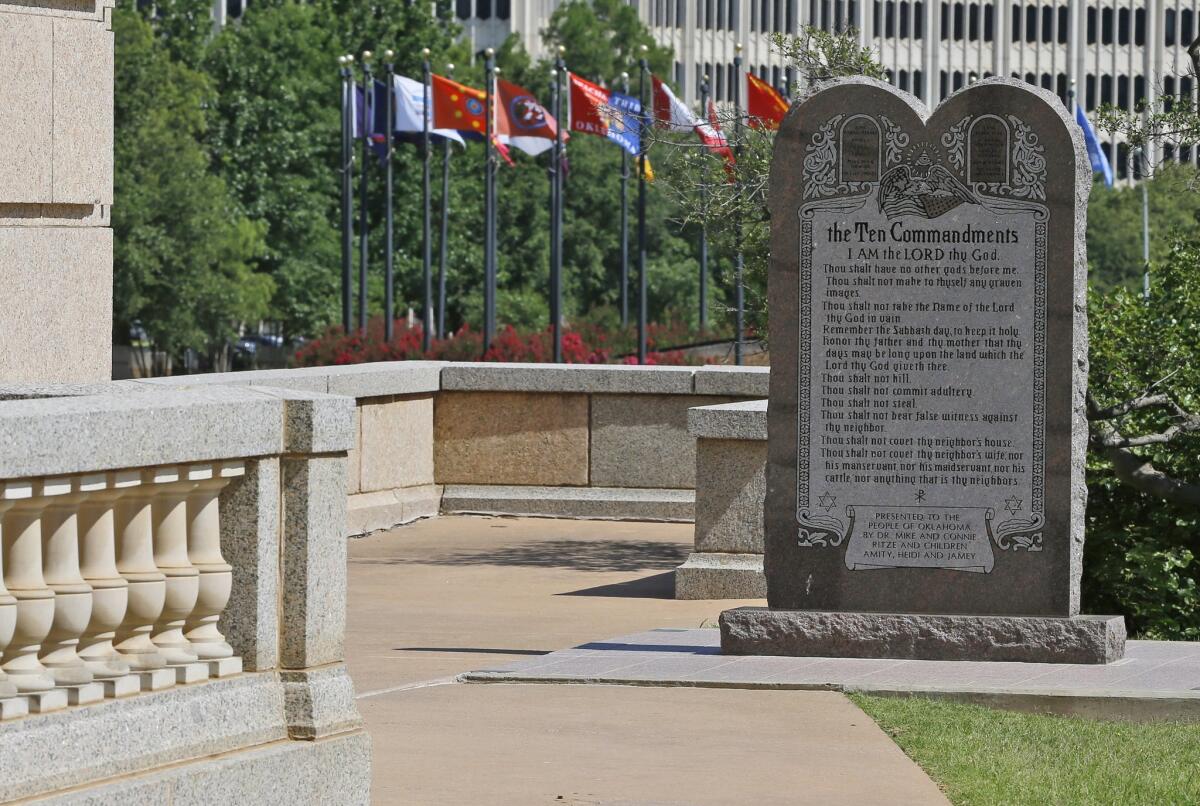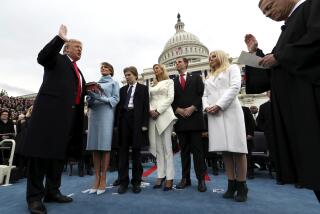Oklahoma Supreme Court must address challenge to its ruling against Ten Commandments monument

The Ten Commandments monument at the state Capitol in Oklahoma City. The state Supreme Court ruled that the monument violates the state constitution and therefore must be removed.
The Oklahoma Supreme Court ordered that a monument to the Ten Commandments on the state Capitol grounds violates the state constitution and must be removed.
In a 7-2 decision, the court ruled Tuesday that because the monument is theological, it violates the Oklahoma Constitution, which prohibits using public money to benefit any religion.
“As concerns the historical purpose justification, the Ten Commandments are obviously religious in nature and are an integral part of the Jewish and Christian faiths,” the court said.
The Oklahoma Constitution prohibits public money, whether used directly or indirectly, for “the use, benefit, or support of any sect, church, denomination, or system of religion.”
The court decided that the use of absolute words such as “any” were indicative of the ban’s broad reach, and that constitutional words should be given their “plain, natural and ordinary meaning.”
The monument’s presence was defended by state officials, religious conservatives and the Oklahoma Capitol Preservation Commission.
“Quite simply, the Oklahoma Supreme Court got it wrong,” state Atty. Gen. Scott Pruitt said in a statement. “The court completely ignored the profound historical impact of the Ten Commandments on the foundation of Western law.”
Pruitt had already filed a petition with the court for a rehearing in light of broader implications of the ruling on state law. “Furthermore, the court’s incorrect interpretation of Article 2, Section 5 contradicts previous rulings of the court,” he added.
The court’s order to remove the monument cannot be enforced until the court addresses the attorney general’s petition for a rehearing.
At issue in this case, Dr. Bruce Prescott, James Huff, Donald Chabot and Cheryl Franklin vs. Oklahoma Capitol Preservation Commission, was whether the Ten Commandments monument violated the Oklahoma Constitution -- not the U.S. Constitution. The court majority contrasted the Oklahoma case with Van Orden vs. Perry, a U.S. Supreme Court ruling in which a Ten Commandments monument in Texas was found not to violate the 1st Amendment.
Although Oklahoma could try to appeal to the U.S. Supreme Court, because the state Supreme Court’s decision is grounded in state law, the highest court in the land is unlikely to accept the case.
The ACLU, which sued the State Capitol Preservation Commission of the State of Oklahoma on behalf of a group of Oklahoma citizens, applauded the decision.
“We’re very pleased with the Supreme Court decision in a controversial case,” said Brady Henderson, legal director of the Oklahoma ACLU.
The Ten Commandments display has been controversial since the state Legislature approved the monument in 2009. Although no public funds were used, the plaintiffs contended that the monument was using public property to benefit religion.
A lower court had sided with the monument’s defenders. County District Judge Thomas Prince ruled last year that there were numerous monuments on the Capitol grounds that were of historical and spiritual significance.
But the ACLU disagreed.
“It’s not about removing anything divine, it’s about having a monument that specifically instructs citizens on what to believe or how to follow God,” Henderson said. “There are simple mentions of the word God, there are tribal flags and crosses on the Capitol grounds. This ruling doesn’t affect those.
“There’s a bit of a misconception that it was about removing everything religious, and that’s not true,” he said.
Rick Tepker, a professor of constitutional law at the University of Oklahoma College of Law, said a voter referendum to change the state constitution was probable.
“I think it’s far more likely there will be a political overruling of the decision rather than a judicial overruling of the decision,” Tepker said.
Twitter: @natalieschachar
More to Read
Sign up for Essential California
The most important California stories and recommendations in your inbox every morning.
You may occasionally receive promotional content from the Los Angeles Times.










